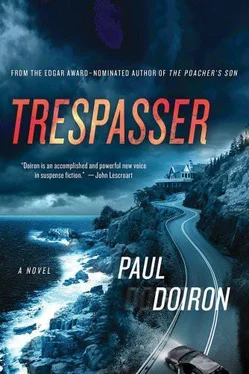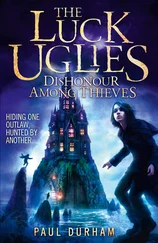Paul Doiron - Trespasser
Здесь есть возможность читать онлайн «Paul Doiron - Trespasser» весь текст электронной книги совершенно бесплатно (целиком полную версию без сокращений). В некоторых случаях можно слушать аудио, скачать через торрент в формате fb2 и присутствует краткое содержание. Жанр: Криминальный детектив, на английском языке. Описание произведения, (предисловие) а так же отзывы посетителей доступны на портале библиотеки ЛибКат.
- Название:Trespasser
- Автор:
- Жанр:
- Год:неизвестен
- ISBN:нет данных
- Рейтинг книги:5 / 5. Голосов: 1
-
Избранное:Добавить в избранное
- Отзывы:
-
Ваша оценка:
- 100
- 1
- 2
- 3
- 4
- 5
Trespasser: краткое содержание, описание и аннотация
Предлагаем к чтению аннотацию, описание, краткое содержание или предисловие (зависит от того, что написал сам автор книги «Trespasser»). Если вы не нашли необходимую информацию о книге — напишите в комментариях, мы постараемся отыскать её.
Trespasser — читать онлайн бесплатно полную книгу (весь текст) целиком
Ниже представлен текст книги, разбитый по страницам. Система сохранения места последней прочитанной страницы, позволяет с удобством читать онлайн бесплатно книгу «Trespasser», без необходимости каждый раз заново искать на чём Вы остановились. Поставьте закладку, и сможете в любой момент перейти на страницу, на которой закончили чтение.
Интервал:
Закладка:
Bell’s worst vitriol was saved for the medical examiner, Dr. Walter Kitteridge, who, more than anyone else, in his view, bore the blame for Erland Jefferts’s wrongful conviction.
Determining the time of death has been described as both an art and a science, and there are many techniques at a medical examiner’s disposal. The temperature of the body is one method, but Kitteridge never measured Nikki’s. Nor did he record the ambient temperature of the forest in which the corpse was found. He also failed to conduct a standard test of her eye fluid, which can indicate the hour of death.
Then there were the blowflies.
In his trial testimony Kitteridge was quoted as saying, “With a cadaver found in the woods in July, I would have anticipated seeing more fly activity, especially after two days. Flies land and lay eggs on the body at sites of injury, as well as the eyes.” That statement suggested, in Bell’s mind, that Nikki hadn’t been dead quite as long as the coroner claimed-and the longer she’d been alive, the more the case against Erland Jefferts fell apart, since he’d been in police custody for a full day before Pluto sniffed out the dead body. So the fly evidence might have been exculpatory.
There was only one problem: The forensic lab had somehow, mistakenly or deliberately, discarded the fly larvae collected at the scene.
In the end, Dr. Kitteridge based his estimation of time of death exclusively on rigor mortis, the extreme stiffening of the body that follows death. From my course work, I understood the process to be a chemical change in the muscles-something about the stoppage of the blood flow causing various proteins to begin locking up in weird ways until digestive enzymes start the process of decomposition.
Bell described the progression: “In an adult, under general conditions, rigor mortis begins in about two hours after death, spreads through the skeletal muscles within ten to twelve hours, and resolves within thirty-six hours after death before the muscles become flaccid again.” Hot temperatures can speed the process up. Body size and physical condition play roles, too. There are innumerable variables, but generally speaking, a body that still shows signs of rigor hasn’t been dead all that long.
When Kitteridge examined Nikki Donnatelli’s body, he reported that “rigor mortis was easily broken.” In the J-Team’s interpretation, this meant that it was scientifically impossible for Erland to have killed Nikki, since he was under police supervision during the entire window of time when she might have been murdered.
Unfortunately for Jefferts, his country bumpkin attorney had failed to pick up this bombshell. And now the lobsterman was serving a life term without the possibility of parole.
Ozzie Bell described himself as an unwilling recruit to the cause. He hadn’t known Jefferts or Donnatelli. But as a former newsman from Queens who’d retired to quiet Seal Cove, he couldn’t help but take an interest in such a heinous crime. He began researching the evidence, spoke with Lou Bates and the principals on the other side, but it was only when he encountered Dr. Kitteridge’s testimony that he had his eureka moment: “The state’s own forensic evidence proved that Erland Jefferts couldn’t possibly have murdered Nikki Donnatelli!”
I didn’t know enough about rigor mortis to share Bell’s certainty. And I had more than a few questions of my own. What about Jefferts’s confession, for example?
“Do you remember what you did with Nikki?” Detective Joe Winchenback had asked him.
“What if I said yes?” replied Jefferts.
Bell and the J-Team waved off this statement. Jefferts had been confused, half-drunk, sleep-deprived. Winchenback never taped Jefferts’s “admission,” and his own contemporaneous notes contradicted the exact phrasing he used in court. Therefore, the detective must have been lying on the witness stand. The primary investigating officer had coerced a vaguely worded confession out of a suggestible young man who couldn’t remember his own actions on the night of Nikki’s disappearance. In effect, Erland had been bullied into making a hedged admission, which the prosecutors instantly held up as proof positive of his bloody deeds.
It makes for one whopper of a story, I thought sleepily. But I doubted any of it was true. It didn’t surprise me that the cops might have conducted a messy investigation. Half my own arrests were fucked-up in one way or another. Had Danica Marshall used every weapon in her arsenal to shoot a rocket up Jefferts’s ass? Of course she had. When a prosecutor got a sex killer in the courtroom, and there was a chance he might walk free, what else was she supposed to do?
I swung my legs off the bed and crossed the creaking floor to the box of files. I leafed through the contents until I came to the collection of photographs I’d noticed earlier. They were pictures of Jefferts having a birthday party in prison with the J-Team. The convict had put on weight over the years, but he was still devilishly handsome, with wavy blond hair and a Hollywood smile.
Attached to one of the photos was a poem.
Solitary
I don’t know why
A man can’t cry.
Holding on to his father’s pain
That will become his son’s in time.
The only legacy left now.
Imprisoned in himself first
And in four walls second.
Iron bars for an iron soul.
From yourself there’s no escape.
No time off for good behavior.
No parole or earthly savior.
Hours go by
And become days.
Days become months.
Months become years.
Walled up in this place
Without sunlight or air.
We are all dead here.
We just don’t know it.
BY ERLAND R. JEFFERTS
The thought of this handsome con man selling his bullshit story to naive friends and family infuriated me. Nothing I could say to Lou Bates or Ozzie Bell would change their minds about him. Those fools were absolutely convinced of Erland’s innocence, just as Jill Westergaard was certain her missing husband was a model of fidelity.
But I knew what kind of a monster Jefferts was. Better than anyone, I knew.
I found the phone number I was looking for on a business card stapled to a folder. I dialed the seven digits and waited until a man with a thick New York accent answered.
“Oswald Bell here.”
“Mr. Bell, this is Mike Bowditch. I read the files you gave me. I’d like to meet Erland Jefferts.”
26
The world was melting. The next day, the sun reappeared, as if it had suddenly remembered it was springtime now and no longer winter. The tidal creek behind the house was swollen with runoff from the dripping ice, and the chickadees in the pines were singing a libidinal tune.
I didn’t tell Sarah where I was going. I let her leave for school in the belief that I planned to spend my day on the couch reading the Hemingway book Kathy had brought me from Key West. I knew that if I told her about my call to Ozzie Bell, she would assume I was meddling in the Ashley Kim investigation-which I was.
Dressing yourself with one hand is harder than you think. After trying for ten minutes to button a flannel shirt, I switched to a military-style sweater. I didn’t even bother attempting shoelaces, but tugged on my neoprene boots. Inspecting myself in the mirror, I thought I looked like a sickly duck hunter about to venture onto the frozen flats. I wondered if the prison guards would discern the opaque Vicodin glassiness in my eyes.
I wasn’t accustomed to driving with my left hand, having to reach across my body to shift gears, using my bad hand to hold the wheel steady. I’d arranged to meet Bell at a gas station up the road from the prison, where he would leave his vehicle. The two of us would ride in my Jeep, we’d agreed.
Читать дальшеИнтервал:
Закладка:
Похожие книги на «Trespasser»
Представляем Вашему вниманию похожие книги на «Trespasser» списком для выбора. Мы отобрали схожую по названию и смыслу литературу в надежде предоставить читателям больше вариантов отыскать новые, интересные, ещё непрочитанные произведения.
Обсуждение, отзывы о книге «Trespasser» и просто собственные мнения читателей. Оставьте ваши комментарии, напишите, что Вы думаете о произведении, его смысле или главных героях. Укажите что конкретно понравилось, а что нет, и почему Вы так считаете.












